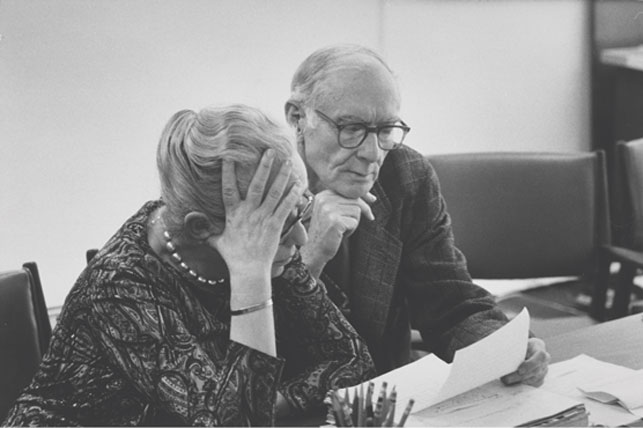
Margaret Scolari Barr with Alfred H. Barr, Jr., January 7, 1971. Photograph by Gjon Mili. Margaret Scolari Barr Papers, V.9*. The Museum of Modern Art Archives
The Margaret Scolari Barr Papers, which document the life and career of Margaret Scolari Barr—noted art historian, teacher, supporter of the arts, and wife of MoMA’s founding director, Alfred H. Barr, Jr—are now open for research at the MoMA Archives. The collection is largely comprised of two-dimensional materials collected and accumulated over a lifetime. Included among these small and at times seemingly innocuous documents are personal and professional correspondence, research materials, drafts and completed publications, newspaper clippings, datebooks, photo albums, travel scrapbooks, art collection documentation, social lists, recipes, and household accounts.
From the beginning of their union in 1930, Scolari Barr acted as one of her husband’s closest collaborators, advisors, and assistants. Their lifelong partnership, both personal and intellectual, is at the core of the collection, which also provided the basis for the chronology of her life and work with Alfred, published under the title “Our Campaigns” in a 1987 special issue of The New Criterion. “Our Campaigns” included reminiscences of important MoMA-related figures such as Henry-Russell Hitchcock and Philip Johnson, and the documents and records pertaining to those and other individuals found in the Margaret Scolari Barr Papers are sure to prove important to scholars and curators working on the rise of modernism in the United States, the creation and development of The Museum of Modern Art, and the illustrious career of Alfred H. Barr, Jr.
Correspondence, ranging from lengthy letters to pithy postcards, is also at the heart of this collection. These communiqués indicate that Scolari Barr was a prodigious and considerate correspondent, while also revealing something of the kind of daughter, wife, scholar, friend, and colleague she was. Not surprisingly, the correspondence between her and Alfred is some of the richest in the collection, displaying at once their lovingly candid and professionally essential relationship. Letters exchanged with well-known contemporaries, among them Varian Fry, Erwin Panofsky, Agnes Mongan, Bernard Berenson, and Leo Steinberg, are also engaging. In many cases, the correspondents discuss issues of connoisseurship and attribution related to the arts of Italy, or offer each other editorial feedback on current projects. These letters not only shed important light on the climate of intellectual comradery that existed between friends and fellow intellectuals; they also speak to Scolari Barr’s abilities as an art historian and the respect her ideas carried in the eyes of her better-known colleagues.
While Scolari Barr’s papers will certainly facilitate continued investigations of her relationship to the work of her husband and the early years of MoMA, this new collection will also hopefully enable new investigations into her independent work—not in an act to recover her from the shadows, per se, but rather in an attempt to create a fuller picture of Scolari Barr as a woman and scholar. Along these lines, many of the documents and records in the collection, particularly those that address gender in relationship both to the theory and practice of mid-20th-century art history, will interest researchers in women’s studies. Curators, scholars, and students in various fields will find the Margaret Scolari Barr Papers a trove of worthy and intriguing historic material that will allow for a recontextualization and expansion of current historical conversations.
Processing of the Margaret Scolari Barr Papers was made possible by the Rona Roob Archives Fund. The collection can be consulted by appointment in the MoMA Archives reading room, Tuesday–Friday, 1:00–5:00 p.m. Appointments can be made through the MoMA Archives contact form.

